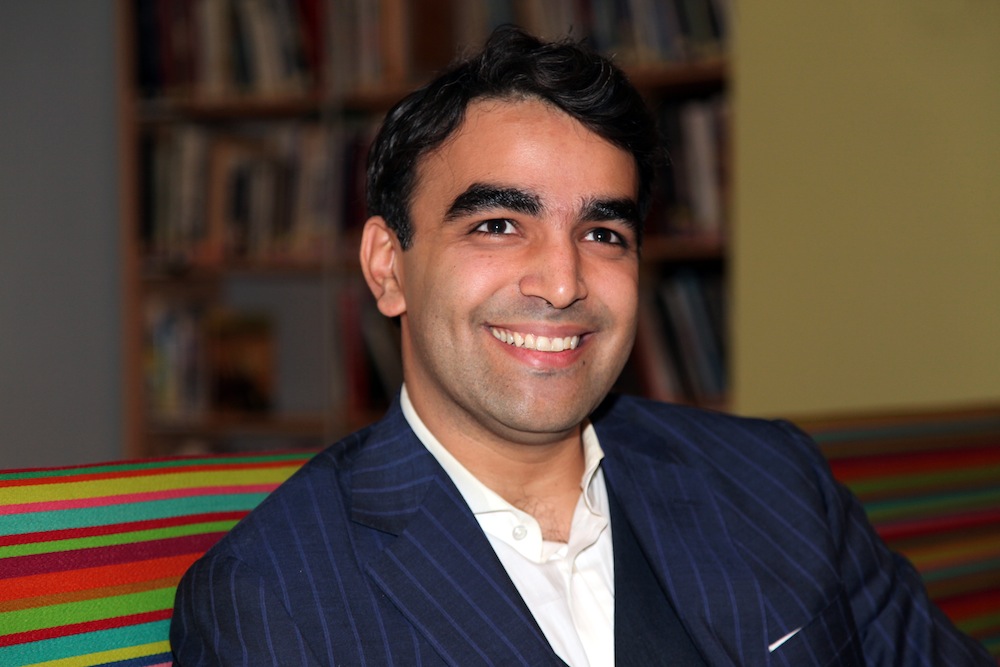
Political scientist Hussein Banai is an assistant professor of diplomacy and world affairs at Occidental College and the co-author of Becoming Enemies: U.S.-Iran Relations and the Iran-Iraq War, 1979-1988. He was born in Iran and raised in Tehran and Toronto, Canada. Before participating in a panel on the possibilities of a warmer relationship between the U.S. and Iran, he reflected on some strange inspirations—Charles Dickens’ depiction of the English working class and former Canadian political leader Michael Ignatieff’s massive defeat—in the Zócalo green room.
Whose talent would you like to have?
I’d like to have the writing skills of a kind of a mid-20th-century British intellectual like Isaiah Berlin. I think writing is enormously important, and that’s a talent that’s really undervalued today.
What’s your favorite Canadian food?
You’re putting me on the spot here. My favorite Canadian food has to be … well, you know, I’m going to go with something that’s really odd for a lot of Americans: poutine, from Montreal. It’s a mix of really bad mashed potatoes or French fries with this kind of gravy on top. If you Google it, the images are not really appetizing, but I like it quite a bit.
Who was your childhood hero?
This will sound really odd, but my childhood hero really was Charles Dickens. I read a lot of novels by Dickens as a schoolboy in Iran in Farsi, and I later learned that the translations were terrible. But nevertheless if I enjoyed them that much in bad translated Farsi, I enjoyed them even more so in English. He was a hero because of his very dark depiction of the English working class, which for some reason was a very romantic image of Britain that I’d very much like to live in.
What’s the last thing that inspired you?
A story I read this morning on Michael Ignatieff, a one-time public intellectual who returned to Canada to run for Parliament, became leader of the Liberal Party, and handed them the worst defeat of the last century. There was a profile of him in The Chronicle of Higher Education, and he talked about defeat in a very confessional style, and how he had become so hubristic, and the urge to please others really distracted him away from his core intellectual commitments. He had this wonderful line where he said, anti-intellectualism is almost necessary for political life. Men and women of action are against books, and that can go too far. It was weirdly inspirational in that it was really a cautionary tale. Those who want to have a public political goal have to be on guard about what that would entail for their intellectual commitments. I find that reflection to be inspirational.
What do L.A. and Toronto have in common?
Very little. The weather is obviously very different. I find the sun to be tyrannical, almost. For me, the cosmopolitan characteristic of L.A. in the U.S. comes closest to what I experienced growing up in Toronto. But I really don’t find much in common between the sunny disposition of Southern California inhabitants and those gloomier, more ironic citizens of Toronto. But Toronto and Los Angeles are home to the two largest Iranian diaspora communities: L.A. is first and Toronto is second. I feel weirdly at home in both L.A. and Toronto because of the proximity of the diaspora community.
Do you have a favorite contemporary Iranian writer?
Can I give you a poet? [Yes.] Simin Behbahani.
Do you have a favorite Iranian restaurant in L.A.?
I think it’s an Armenian restaurant—it’s called Raffi’s, in Glendale—which has very good kebabs. It’s Iranian; I’m not sure if it’s Armenian. I’ve only been here a year, and I’ve barely gotten out of Eagle Rock.
What teacher or professor, if any, changed your life?
Without a doubt, a guy by the name of Ross Rudolph at York University. He taught introduction to politics, and he had this—kind of like a commercial pilot suitcase, one of these fat ones. He would come to class and put it on the desk, and he started talking about Plato and the allegory of the cave. I thought I was going to be a business student, and that just swept me off my feet and set me on the path of an academic career early on.
What do you wish you had the nerve to do?
I wish I had the nerve to move to the countryside, abandon all these years of study, and tend to a little farm where I could subsist on everything that I raise myself, and nevertheless be completely fulfilled and just enjoy the company of friends and family around me. But alas, I’m not there yet. Maybe it’ll come one day. But from time to time I just have the urge to pick up and go.
What’s your absolute worst habit?
I have too many flaws, so I have to think which one … I have this very awful habit of playing with my hair. Especially in public places as I am listening to someone, I start just uncontrollably running my fingers through my head, and dozing off into another state of mind that sometimes gives the impression to people that I’m not paying attention to them.



